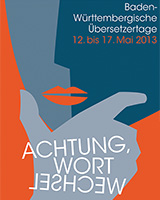From Shakespeare to Astérix via Mozart
9 April 2013

Achtung Wortwechsel![*] is the motto of the 9th Baden-Württemberg Translators’ Week, taking place this time in Heidelberg. From 12 to 17 May 2013, the City of Heidelberg and the University will be joining forces to lay on over 60 events, workshops and literary exhibitions for local citizens (adults and children alike) and a specialist audience. The aim is to bring home to the public in an informative and entertaining way the vital significance of translation and interpreting in establishing and maintaining links between the cultures of the world. The topics range from translation of the Astérix comics and the recasting of Shakespeare’s dramas in German to a podium discussion involving crime writer Ingrid Noll and two of her translators.
The organisers of the Translators’ Week are Heidelberg University’s Institute of Translation and Interpreting (IÜD) and Heidelberg Municipal Library. But the programme is so wide-ranging that it spills over into many other locations as well, including the Intercultural Centre, the Municipal Music School, the German-American Institute, St. Peter’s Church, a record shop and four cafés. The official opening is on Monday, 13 May, at 6 pm at City Hall. Subsequently, a forum entitled “Translation: Art, Science or Skill?” at 8 pm will be recorded for broadcasting on SWR2 radio. Panel members are translation scholar Prof. Dr. Norbert Greiner, publisher and author Michael Krüger and translator and editor Karin Nölle. Moderator is SWR2 Forum coordinator Ursula Nüsser.
The actual programme of events begins a day earlier on Sunday, 12 May, with a guided tour of the Old Town in German, English and Spanish devised by students of the IÜD. Tours of the same kind are on offer throughout the week, focusing on different historical and topical subjects every day. Among the highlights in the programme are a discussion of the translations of Mozart’s opera Le Nozze di Figaro with musical examples entitled “Mozart in the Clutches of his Translators” and a discussion with journalist Peter Zschunke on politics and language. Theatre director and award-winning translator Frank Günther reports on the Herculean labours involved in the complete translation of Shakespeare’s works into German that he has been engaged in since the 1970s. Three exhibitions are on show, devoted to translation in the Metropolitan Region, children’s books from Latin America and translations brought out by Heidelberg publishers. For children there is a special guided tour of the city and a literary expedition to the world of the native Americans. The Week ends with an Open Day at the Institute of Translation and Interpreting, culminating in the announcement of the prize-winners in a student literary translation competition.
The Baden-Württemberg Translators’ Week is a biennial event dating back to 1998. It was established by the Ministry of Science, Research and the Arts in conjunction with the Circle of Friends for the Promotion of Literary and Scientific Translations and takes place in a different city each time.
For more information, go to www.uni-heidelberg.de/uebersetzertage2013.
Contact
Katja Ebel
School of Translation and Interpreting
phone: +49 6221 547722
katja.ebel@iued.uni-heidelberg.de
Beate Frauenschuh
Heidelberg Municipal Library
phone: +49 6221 5836180
beate.frauenschuh@heidelberg.de
Communications and Marketing
Press Office
phone: +49 6221 542311
presse@rektorat.uni-heidelberg.de
[*] The Translators’ Week’s motto Achtung Wortwechsel! plays suggestively on the different associations the phrase arouses, containing as it does the word Wortwechsel (meaning an exchange of words) and the allusion to the traffic sign Achtung Wildwechsel! (Caution! Animals Crossing). Together the two elements summarise very aptly the difficulties involved in ensuring genuine communication in translation, which can legitimately be seen an exercise in enabling texts to “cross” from one language and culture to another.

